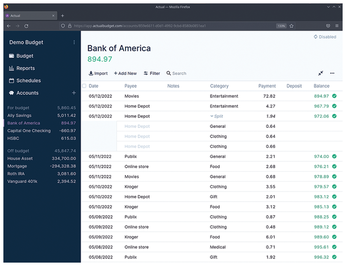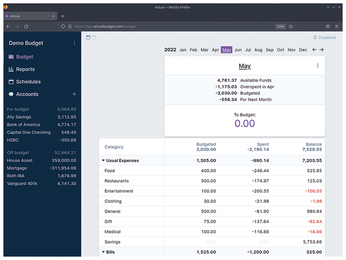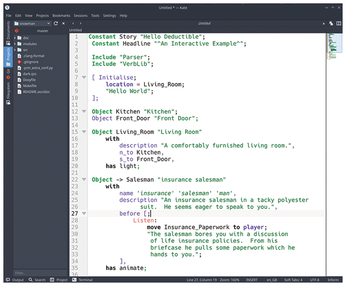Sparkling gems and new releases from the world of Free and Open Source Software
Actual
Dealing with home finances, budgeting, and accounting can be a little like backing up your data. It's something you know you should do, and something you know is going to be easier when done preemptively, but it's seldom something to look forward to. It's also something that Linux can help with, both to temper the tedium of the process and to add powerful insight and automation. For many years, one of the best home finance tools on Linux (and more recently Windows and macOS, too) has been GnuCash (https://www.gnucash.org), and it's still a great option if you want an offline accounting tool to keep track of your accounts, budgets, and spending. But for maximum convenience, you really need to be able to log your transactions and update your budgets on the go, which is something that you obviously can't do offline.
There are a variety of hosted application services that will offer you this functionality online, and until recently, Actual was one of those. Like GnuCash, Actual's model is built around transactions that either credit or debit your accounts. Accounts represent your checking accounts, savings accounts, and credit cards, but also investments, mortgage, debts, and anything more general. They can also be either budgeted or outside of your budget, and each transaction can have its own notes and category, and can be easily split across multiple designations. Transactions from other applications can be imported via QIF, OFX, QFX, and CSV files, and Actual will automatically keep everything up to date as you transfer, spend, and save and will produce handy reports on where you might be heading and how much is left of your monthly budget. This can be further broken down into category types so you can easily see how much you're spending on food, for example, or entertainment.
Unlike GnuCash, Actual is easy to use and doesn't try to force the user into double booking every transaction against two accounts. The web UI is beautifully designed and is also fast and responsive. Most importantly, it's designed to make you want to add each transaction and enjoy the fulfillment that comes with keeping track of your finances. Adding each transaction is quick after you've set up the accounts and the transaction types. As with many applications of this type, there's an excellent report generator that will by default graph your fluctuating net worth, but it's easy enough to create your own custom reports too.
There's a Linux desktop application that encases all of the same functionality, and while all of this was originally done via a paid service, the project has recently become truly open source. All of its code, including code for the server and web app, the desktop app, and even accompanying Android and iOS apps has been released under an MIT license. This means you can now self-host your own instance with a simple npm install and be entirely in control of both your budget and the data used to manage it. It's a shame the original initiative didn't earn the developer enough to keep the project running as a commercial initiative, but it's wonderful that they decided to release all of their code as open source rather than letting the previously proprietary code rot. With a bit of luck, it will be picked up and bootstrap an active community of Actual developers and users.
Project Website
https://github.com/actualbudget/actual
 The best thing about Actual is the beautiful design that makes entering every financial transaction a genuine pleasure, ultimately saving you money.
The best thing about Actual is the beautiful design that makes entering every financial transaction a genuine pleasure, ultimately saving you money.
 Budget reports show you how much you've spent in each transaction category, and most importantly, how much you've got left to spend.
Budget reports show you how much you've spent in each transaction category, and most importantly, how much you've got left to spend.
Game compiler
Inform 7
Interactive fiction games are amazing. They have the best graphics, the best sound, the best characters, and the best level of immersion you can possibly imagine. That's because you do imagine it. Interactive fiction games rely on text descriptions and an interpreting text input grammar to build their worlds. As a result, their worlds are built in your imagination, just like real fiction. When they first appeared in the 1970s, text was a necessity rather than a choice because graphics capabilities were so limited. Everyone assumed that as graphics improved, interactive fiction would become subsumed by the wider gaming ecosystem. That happened to an extent, and it's certainly difficult for the imagination to compete with the hyperrealism of games such as Cyberpunk 2077 or Red Dead Redemption 2. But like books, interactive fiction has more than survived and is still flourishing in its own way. Every year, dozens of games are written, and many are available for free, stretching the original ideas and capabilities way beyond what was imagined in the early days.
Central to its longevity is the programming language and environment used to build the games. There are a few, but the best is undoubtedly Inform, which has been in development for almost 30 years. It initially started out to create games that would run on Infocom's famous virtual machine but later expanded to add other capabilities. Version 7 implemented a novel natural language processor and a new set of tools. While it's always been available for free, it's finally become available under an open source license. This is brilliant news for the future of interactive fiction and involved a lot of work renovating the original codebase and increasing code clarity, consistency, and reliability. Thanks to the IDE, it's also easy to get started and you don't need to be a programmer to write your own interactive fiction. You simply need to have a good imagination.
Project Website: https://ganelson.github.io/inform/
Buy this article as PDF
(incl. VAT)
Buy Linux Magazine
Subscribe to our Linux Newsletters
Find Linux and Open Source Jobs
Subscribe to our ADMIN Newsletters
Support Our Work
Linux Magazine content is made possible with support from readers like you. Please consider contributing when you’ve found an article to be beneficial.

News
-
Ubuntu 24.04 Comes with a “Flaw"
If you're thinking you might want to upgrade from your current Ubuntu release to the latest, there's something you might want to consider before doing so.
-
Canonical Releases Ubuntu 24.04
After a brief pause because of the XZ vulnerability, Ubuntu 24.04 is now available for install.
-
Linux Servers Targeted by Akira Ransomware
A group of bad actors who have already extorted $42 million have their sights set on the Linux platform.
-
TUXEDO Computers Unveils Linux Laptop Featuring AMD Ryzen CPU
This latest release is the first laptop to include the new CPU from Ryzen and Linux preinstalled.
-
XZ Gets the All-Clear
The back door xz vulnerability has been officially reverted for Fedora 40 and versions 38 and 39 were never affected.
-
Canonical Collaborates with Qualcomm on New Venture
This new joint effort is geared toward bringing Ubuntu and Ubuntu Core to Qualcomm-powered devices.
-
Kodi 21.0 Open-Source Entertainment Hub Released
After a year of development, the award-winning Kodi cross-platform, media center software is now available with many new additions and improvements.
-
Linux Usage Increases in Two Key Areas
If market share is your thing, you'll be happy to know that Linux is on the rise in two areas that, if they keep climbing, could have serious meaning for Linux's future.
-
Vulnerability Discovered in xz Libraries
An urgent alert for Fedora 40 has been posted and users should pay attention.
-
Canonical Bumps LTS Support to 12 years
If you're worried that your Ubuntu LTS release won't be supported long enough to last, Canonical has a surprise for you in the form of 12 years of security coverage.


